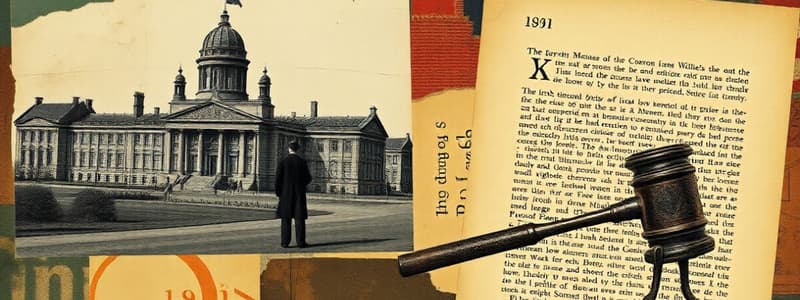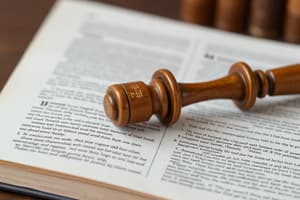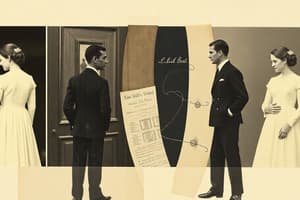Podcast
Questions and Answers
What is the purpose of law according to Chapter 1?
What is the purpose of law according to Chapter 1?
To regulate human conduct within a State and maintain a standard of behavior.
Which of the following are legal sources of Irish law? (Select all that apply)
Which of the following are legal sources of Irish law? (Select all that apply)
- Traditional customs
- The Irish Constitution 1937 (correct)
- Historical sources
- Legislation (statute law) (correct)
The Irish legal system is solely based on written law.
The Irish legal system is solely based on written law.
False (B)
What significant change happened to Irish law in 1937?
What significant change happened to Irish law in 1937?
At the time of the Norman Conquest, the legal system was based on ______.
At the time of the Norman Conquest, the legal system was based on ______.
Common law was flexible and always provided adequate remedies for legal grievances.
Common law was flexible and always provided adequate remedies for legal grievances.
What was the role of the King and his Chancellor regarding legal petitions?
What was the role of the King and his Chancellor regarding legal petitions?
What is a basic distinction between civil law and criminal law?
What is a basic distinction between civil law and criminal law?
Flashcards are hidden until you start studying
Study Notes
Functions of Law
- Law is enforced by a state to govern human conduct.
- The law is not static, it evolves reflecting the values of each era.
- Law serves to protect property rights, uphold public order, foster economic growth, and address social challenges.
Sources of Irish Law
- Irish law originates from and is similar to English law.
Historical Sources of Law
- The Brehon laws were the highly developed native laws of Ireland before the Norman Conquest.
- After the Conquest, English common law was implemented.
- Since the establishment of Ireland as a free state in 1922, Irish law has evolved under the 1937 Irish Constitution (Bunreacht na hÉireann) and new legislation.
Legal Sources of Law
- Legislation (Statute Law): Laws passed by the Irish Parliament (Oireachtas).
- Subordinate Legislation: Laws created by government departments or agencies, authorized by primary legislation.
- Irish Constitution 1937 (Bunreacht na hÉireann): The fundamental legal document setting out basic rights and principles.
- European Union Law: Laws made by the EU that apply to Irish law.
- Judicial Precedent (Statutory Interpretation): Decisions of courts, which can set a legal precedent for future cases.
Common Law
- Common law developed from local customs that were unified under the King.
- Royal justices travelled to different parts of the realm to settle disputes, using local customs as a basis for their decisions.
- This common law system was made applicable to all of England and Wales.
- Ireland became subject to Common Law by 1331.
Evolution of Common Law
- Common law evolved into a rigid and harsh system.
- It became difficult to obtain justice due to complex procedures and limited remedies.
- Dissatisfied litigants petitioned the King for relief, leading to the establishment of the Court of Chancery.
Studying That Suits You
Use AI to generate personalized quizzes and flashcards to suit your learning preferences.




